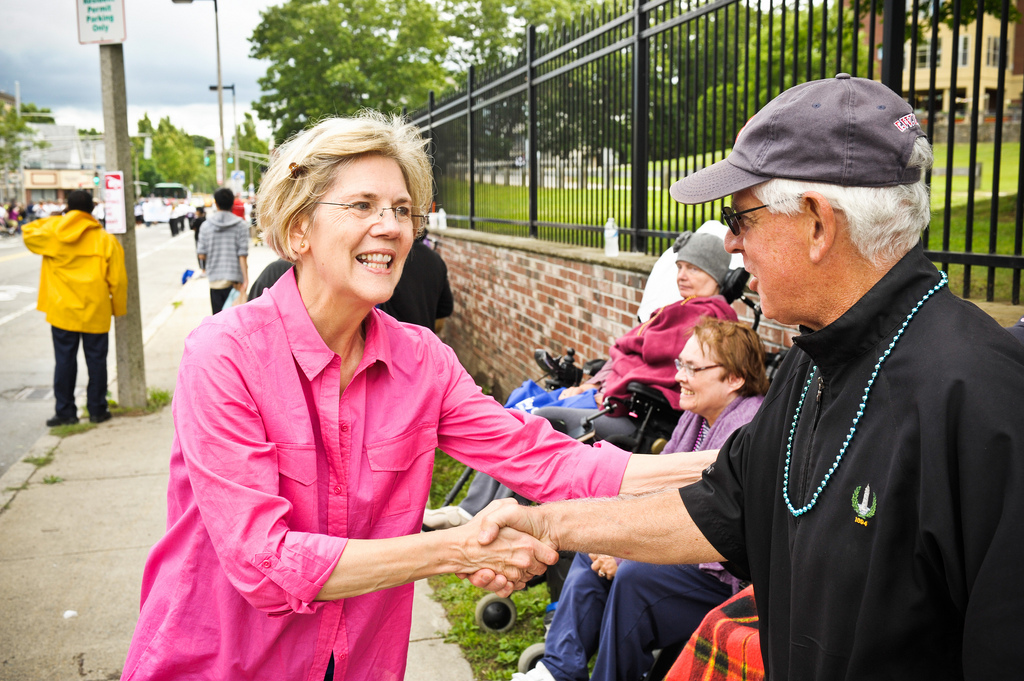Recently, NU Political Review Domestic Editor Sean Comi and Deputy Domestic Editor Mike Leyba had the opportunity to interview Senate Candidate Elizabeth Warren. The following interview took place over two days, via phone and on Northeastern’s campus. Professor Warren begins by filling us in on what her campaign has been doing on college campuses.
EW: Right now, our campaign has over 300 interns on college campuses across the Commonwealth. We have interns who have been working hard and they’ve been working hard on their campuses. They’ve been in student centers, in dining halls, they’ve been speaking to classes, using social media, out there talking about the campaign, and as a result of their efforts, they’ve signed up more than 1,500 student volunteers for the Elizabeth Warren campaign, and they’ve registered thousands of their peers to vote this November. I think it is a remarkable engagement, that college students are there, an important part of this campaign, and it’s really being felt in the numbers. So I’ll just stop my notes by saying I’m so proud of our efforts to reach out to college students, to engage young people in the campaign. I’m in this race because I believe we need to invest in our future and create opportunities for the next generation. Having college students all across the Commonwealth of Massachusetts as partners in this race is critical — it is what this race is about. So with that, I am just going to stop talking and we’re going to go to questions.
NUPR: Hi, thanks for taking the time to speak with us. Vice President Biden asserted that the next President would be likely to appoint two Supreme Court Justices; of course he can’t do this without the Senate. As a Senator, what would your litmus test for a nominee be?
EW: Well, you are right to note, and I think the Vice President is right to note, that control of the Senate is powerfully important because it will influence control of the United States Supreme Court. I thought one of the most telling moments of the three debates so far that Senator Brown and I have had was the moment in the second debate when Senator Brown was asked to name his model Supreme Court Justice, and he picked Justice Scalia; Justice Scalia is someone who described Roe v. Wade as ‘utterly idiotic.’ He believes that the equal protection clause of the United States Constitution does not cover women, and he believes that it is alright for states to outlaw birth control and to treat same-sex couples as criminals — and that is not my idea of a model Supreme Court Justice.
I picked Elena Kagan, whom I know and think is imminently qualified, but I think that’s a big difference between Senator Brown and me, and the impact of this Senate race. You asked a question, and I always like to answer them straight on, about a litmus test; I’m not sure I can describe a litmus test. I believe it ought to be someone who should follow the law, but mostly we can’t have people who are extremists sit on the United States Supreme Court. The long-term impact is terrible for us, and you know, the Supreme Court, this is a good place to make a particular link. Assuming President Obama is in the White House, and that is something that I very much support and very much hope he is in the White House, if he faces a Senate that is controlled by the Republicans, he will be in a very difficult position on getting someone into the United States Supreme Court, and this is something that could have an impact as we have learned just over the last few years, throughout a wide range of areas on women’s rights, on human rights, on healthcare, on money in politics, so this one is a huge one and I want to work with the President to get moderate Justices in the United States Supreme Court.
NUPR: What do you think will be the first piece of legislation that you will pursue?
EW: Oh, the very first piece? That’s a tough one Sean, and I’ll tell you why it’s a tough one.. Its a tough one in the sense that I’m very opportunistic, when the question came up — I’ve been fighting out there, I don’t know if you know this, but for a long, long time against mortgage companies, against credit card companies, student loan companies, for their abuses — but it was when I saw the opportunity following the crash in 2008 that the financial rules were being rewritten, that’s when I came in and said let’s do the Consumer Financial Protection Bureau. You look for the opportunities where you can make something happen. And, I should say in that case, have the wind in your sails, have enough people behind it to make it happen, even when the lobbyists in Washington and politicians may be opposed to it. So that’s kind of my operating mode.
But in my perfect world, one of the very first things I want to do is work on how we pay for college. This is a critical part of how we build a future as a country. Students now owe more than 1 trillion dollars in college loan debt and it is crushing them, and it has long-term implications on this economy. We can’t keep going in this direction. So there are lot of different ways to look at that, a lot of pieces to that, about student loans, about aid particularly to community colleges and public universities, about stepping up federal support for STEM (science, technology, engineering, and mathematics) education. So I think there are a lot of different approaches to it, but it would be very high on my priority list.
I suppose the other one I should mention — I’m talking about big structural pieces — the other one I should mention, the very first thing I will do when I go to Washington is we’ve got to have a jobs bill. Here in Massachusetts, we’ve got more than 200,000 people unemployed. Putting people back to work, that’s the short-term answer. Putting people back to work, there’s work that needs to be done, people who need work, they get paychecks, they spend those paychecks in the local economy, it just helps the economy get off the ground [and become] stronger. For short-term, it’s jobs, starting the long-term investment, it’s looking at college, so I think that at least gives you some idea of the priorities, but boy there’s a lot out there and a lot that we need to do.
NUPR: There is no doubt that your campaign is one of the most high profile in the nation. How has this affected your strategy? Does it make it any easier, does it make it more difficult?
EW: There’s nothing that makes this easier. It’s interesting you would focus on this because it’s something I thought about right at the beginning of the race and I don’t think I’ve heard anybody talk about since then. And that’s the power of convincing and how if an incumbent wins that first time they are up for reelection the odds that they have the seat for decades to come goes up dramatically. And it’s just one more way of saying that this race really matters. Its about how Scott Brown votes on core issues: women, jobs, the environment. But it’s also, about control of the Senate and also, the long-term arc in politics.
NUPR: Why are you better suited to represent the people of the Commonwealth of Massachusetts than Senator Brown is?
EW: I’m not interested in going to Washington to work for millionaires, and billionaires, and big oil. I want to go there for working families, for small businesses, and most of all, to build a future. It’s to build a future for all of our kids and that cuts in every direction. What makes our country exceptional is that we believe in opportunity. I grew up in an America when opportunity was expanding. There were lots of places it didn’t reach, but it was expanding. I’m the daughter of a janitor that ended up as a Professor at Harvard because America invested in kids, and starting roughly 30 years ago, American started backing off from that. Our leaders starting telling us that the job of government is not to help us do the things together that none of us can do alone, but the job of government is to protect those that have already made it and that means underinvestment, underinvestment in education, underinvestment in the infrastructure that creates opportunities, underinvestment in research that is the pipeline of ideas. We can’t head any further down that path, we really have come to the fork in the road and I am concerned that the decisions that the Republicans are pushing can fundamentally change this country. Not for a few years, not till the next race, but for the next half century. It’s all on the line.



